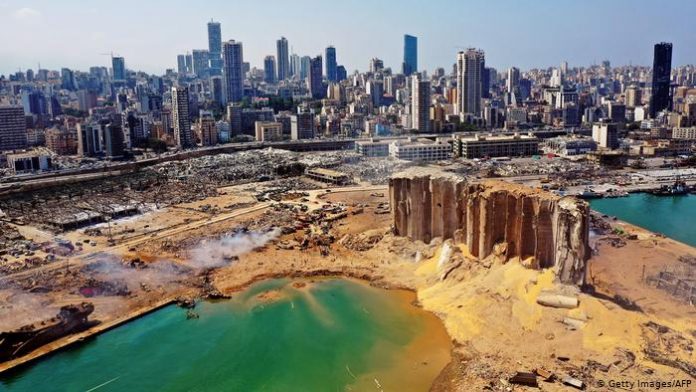The Lebanese government has declared a two-week state of emergency, granting the military full powers during this period. The measure was declared following a meeting by the country’s Cabinet.
Among the first actions, the Cabinet took was instructing the military to place an unspecified number of Beirut port officials under house arrest. This is reported to include any officials involved with the administration of the warehouse since 2014.
An investigation is underway to determine how the warehouse came to hold some 2,750 tons of ammonium nitrate for years and what set off the explosion, amid speculation that negligence could have played a role.
Lebanon’s Cabinet also approved the allocation of some 100 billion Lebanese pounds to deal with the crisis, which is worth approximately $66 million (€55 million) based on the official exchange rate. But the sum is effectively worth some $13 million based on the latest rate on the parallel market.
14:35 Norwegian Foreign Minister Ine Eriksen Soereide said the country’s embassy in Beirut suffered damage in the explosion, but reported that all staff members were safe.
Norway has offered 25 million kroner ($2.74 million) and 40 tons of medical equipment in the aftermath of the huge explosion.
”The situation is pretty confusing right now. In the coming days we will know more about what is needed in the long-term need,” Soereide added.
13:28 German Chancellor Angela Merkel has been left “dismayed” by the blast in the Lebanese capital.
“I was very dismayed to learn of the severe explosion in Beirut, which has claimed many victims,” wrote Merkel in a letter of condolence to the Lebanese Prime Minister Hassan Diab.
“In this difficult time, you can count on the help and support of the German government,” Merkel added.
Meanwhile, Foreign Minister Heiko Maas told the German newspaper Bild that he had been in contact with his Lebanese equivalent about “how Germany can now help quickly and without red tape.”
“With the German Armed Forces and our humanitarian workers, we are looking at how we can provide further help for clearing up and supplying the civilian population,” Maas said. “The images of the devastation in Beirut hit us right in the heart, they hurt.”
German President Frank-Walter Steinmeier wrote to his Lebanese counterpart Michel Aoun.
“The images of the massive destruction in the middle of the city shook me deeply,” Steinmeier said, as part of a message where he also expressed his condolences to the family and friends of the victims.
“I wish you and your citizens strength and confidence in these difficult times.”
13:01 The chief executive and director of the German Institute for International and Security Affairs (SWP), Volker Perthes, has told DW that it is “important for Europe that Lebanon becomes a stable country again,” in the wake of the deadly explosion in Beirut.
The Middle East expert has called on the IMF, the World Bank, and the EU to “speed up negotiations” over economic support and reforms of the political system.
Perthes also warned that Lebanon’s problems will have an impact on Europe, saying: “Economic, political and social crises do not tend to stay inside that country, but migrate, in a way, to Europe.”
In the near future, the international affairs specialist expects that “protests against the government and the way Lebanon is governed will increase.”
He added the main question now “is whether the Lebanese political elite is prepared to give up some of their privileges, some of their fiefs, and actually get into a conversation with Lebanese civil society about reform in the country.”








